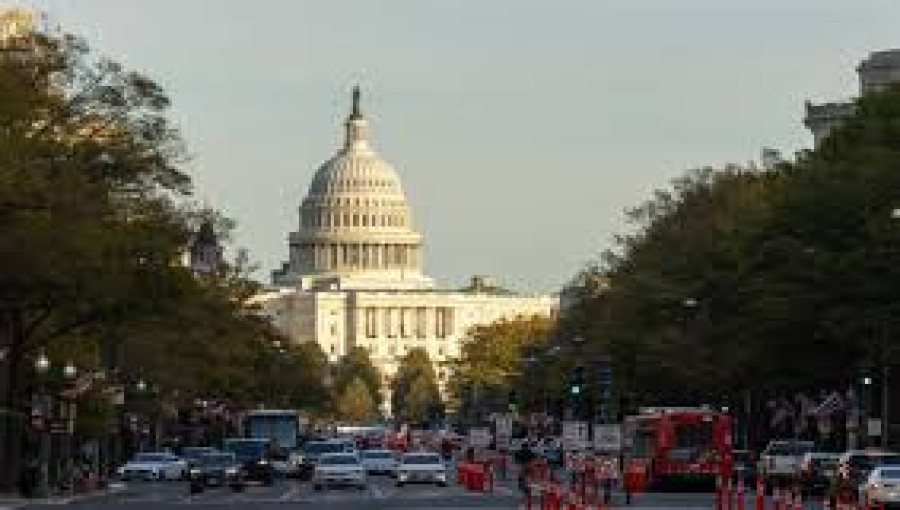Wasington, D.C., Dec 20, (V7N) - The fate of hundreds of thousands of federal employees and the services they provide depends on whether Congress can reach an agreement to extend government funding past Friday. With a looming deadline, the stakes are high for both government employees and the American public, as Congress works to avoid a government shutdown.
Congress’s Plan and the Shutdown Threat
Congress had initially proposed a bipartisan plan to fund the government through March, but President-elect Donald Trump has opposed this plan. This leaves lawmakers scrambling to find a new agreement that can avert a shutdown before the holidays. If Congress fails to reach a funding deal, the government will be forced to shut down, impacting numerous federal agencies and workers.
During a shutdown, only federal workers deemed "essential" would remain on the job. These employees are crucial for maintaining national security, law enforcement, and other critical operations. However, even those deemed essential, such as air traffic controllers and law enforcement officers, will see their paychecks delayed, though they will be reimbursed for their wages once a funding agreement is reached.
Impact on Federal Employees
The U.S. has nearly 2 million federal employees spread across all 50 states and the District of Columbia. These employees perform a variety of essential tasks, from safeguarding national security to maintaining the country’s infrastructure. In the event of a shutdown, employees classified as “nonessential” would be furloughed, meaning they would be sent home temporarily without pay.
However, it’s important to note that furloughed employees are not permanently laid off and will eventually be paid retroactively once government funding is restored. This was guaranteed by legislation passed in January 2019, ensuring that all federal workers receive backpay for the time they were furloughed. This includes both essential and nonessential workers, with the caveat that essential workers continue working without pay during the shutdown.
Key Federal Agencies During Shutdown
Certain federal agencies will continue operations despite a shutdown:
-
Law Enforcement and National Security:
Federal law enforcement agencies, such as the FBI and DEA, would remain fully operational, as would prison staff. Border Patrol agents, immigration enforcement officers, and customs agents will continue their duties. These agencies are deemed essential for public safety and national security. -
Transportation:
Transportation Security Administration (TSA) agents, air traffic controllers, and other airport security personnel would remain on duty. However, past shutdowns have caused some airports to experience absenteeism, which disrupted operations. During peak travel seasons, the TSA would also be unable to hire new staff to meet security demands, potentially affecting airport operations. -
Military Personnel:
The U.S. military would continue operating, with approximately 2 million personnel remaining on duty. However, civilian employees at the Pentagon, numbering around 800,000, would face furloughs, significantly affecting defense operations and services. -
Mail Services:
The U.S. Postal Service, which is self-funded and does not rely on Congress for funding, would continue delivering mail without disruption. -
National Parks and Monuments:
National parks, monuments, and other federally managed sites would technically be closed to the public. While visitors may still be able to enter, they would not have access to services such as restrooms, help desks, and other park amenities. Past shutdowns have caused some parks to fall into disarray due to the lack of staff for maintenance and operations. -
NASA and Space Operations:
NASA would continue to monitor satellites, manage the International Space Station (ISS), and support astronauts in orbit. However, NASA’s workforce would be greatly reduced, with approximately 17,000 out of 18,300 employees expected to be furloughed. -
Environmental and Health Services:
The Department of Energy's National Nuclear Security Administration, responsible for maintaining nuclear weapons and safeguarding energy resources, would continue its operations. Efforts to combat wildfires and address public health needs would also proceed with minimal disruption.
Furloughs and Unemployment Benefits
Federal workers who are furloughed are temporarily prohibited from working due to the lack of funding. This can be a significant financial strain for workers, as they are not compensated during this period. However, they are guaranteed back pay once funding is reinstated.
Employees who are furloughed or not working due to the shutdown can apply for unemployment benefits. The U.S. Department of Unemployment Services offers resources for workers to apply for unemployment compensation based on the jurisdiction where they work.
Congressional Pay and Operations
While many federal workers face furloughs and missed paychecks, members of Congress will continue to receive their paychecks without interruption. Even staffers who are not essential will be furloughed, while essential offices, such as the National Security Council, will continue functioning. The White House, too, would continue operations, but with a reduced staff.
Shutdown's Potential Effects on Services and the Economy
If the shutdown continues for a prolonged period, federal services may be severely impacted, particularly for Americans who rely on government programs and assistance. This includes services related to healthcare, education, and environmental protections. Additionally, the economic impact of a shutdown can be significant, as it disrupts daily operations and undermines public trust in government institutions.
Conclusion
A potential government shutdown poses considerable challenges for federal employees, the agencies they serve, and the public who relies on government services. While essential services and workers will continue to operate, the lack of funding would impact millions of people. Congress faces a critical test to resolve the funding impasse and avoid further disruptions before the holidays.
END/SMA/MSS/































Comment: